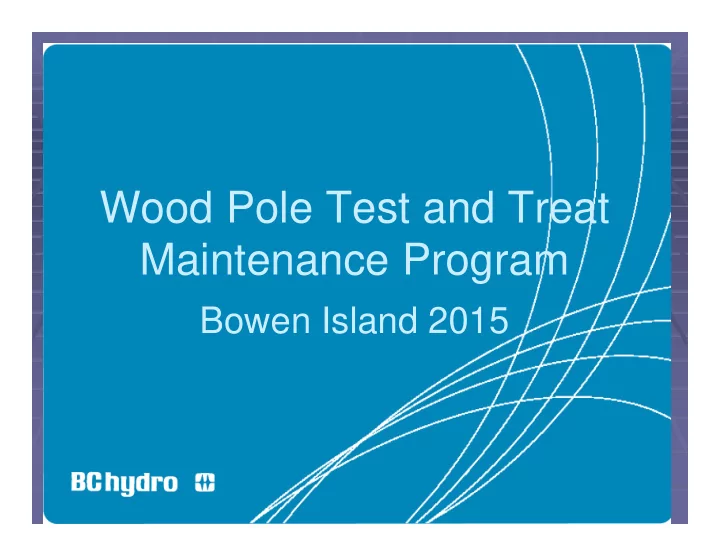

Wood Pole Test and Treat Maintenance Program Bowen Island 2015
BC Hydro Representatives Raymond Irving – Field Manager, 250- 755-4798 Terry Giesbrecht – Pole Maintenance Coordinator, 604-302-5511 Spencer Nicholson – Pole Maintenance Coordinator, 604-250-9430 Rene Roddick – Vegetation/Pest Biologist, 604-543-1533
BC Hydro Test & Treat Program operates on an 8 year cycle. Approximately 105,000 distribution poles and 11,000 – 13,000 transmission poles are treated every year This image cannot currently be displayed. This image cannot currently be displayed.
Why Do We Treat Poles? Safety public and property safety, and crew safety while working on poles Reliability continuous uninterrupted service to our customers Environmental use of preservatives reduces number of trees to be harvested, minimizes impact of disposal/recycling of used poles, and minimizes ground disturbance Financial Responsibility cost effectiveness of maintenance versus pole renewals
Public Safety Hazard Pole failures Pole rotted off at groundline
Work Plan – Bowen Island Program will begin October 15 – 30, 2015 Approximately 1,517 poles Up to 5 crews of certified applicators
Work Plan (cont’d) Vehicle Id with BC Hydro contractor sign Applicator checks for wells and water at each site – maps, physical search, looks for flags and pins placed by residents Pre-job with contractor prior to commencement of work
Pest Management Plan (PMP) Wood preservatives approved and registered for utility wood poles by Health Canada Contractors certified and licensed by the BC Ministry of Environment (MoE)
PMP (cont’d) Work under Pest Management Plan for Wood Structure Maintenance by the BC Hydro and Power Authority Work strict adherence to Integrated Pest Management Act and Regulations
Pole Inspection Process Inspectors assess poles above ground for safety and equipment condition: Damage from insects, woodpeckers, vehicles Visible signs of rot Equipment failure/damage Sound, probe and drill to assess for insect/rot/damage
Pole Inspection (cont’d) Inspectors assess poles below ground: Look for shell rot Probe and drill to assess pole condition and strength insect/fungus damage
This image cannot currently be displayed. Drilling Poles
Fumigant placed into drill holes using hand- operated sprayer
Boron Rods
This image cannot currently be displayed. Installing Plugs
This image cannot currently be displayed. Field-Made Pole Bandage
This image cannot currently be displayed. Installing a full bandage
Clean-up This image cannot currently be displayed.
Wood Preservatives Metam sodium fumigant: liquid preservative placed in drill holes in pole and capped (preservative contained in pole) mixes with moisture inside poles and evaporates into pole within 7 hours Other uses: commonly added to soil for planting preparation in agriculture.
Wood Preservatives (cont’d) Copper hydroxide borate bandage: wrapped and stapled around pole below ground bandage covered in water-repellent material preservatives bind strongly to the wood pole
Wood Preservatives (cont’d) Boron/copper rods: solid rods are placed in drill holes and capped to contain preservative in pole preservative released slowly into pole over a period of 10 years Other uses: natural sources of boron are commonly found in soil. Used in eye wash and soaps.
Human Health Protection Field crews check multiple information sources prior to treatment to ensure human health and water are protected: GIS mapping reviewed for locations of registered wells, watersheds, and waterbodies Check for flags and pins placed by residents Sensitive ecosystems and waterbody mapping (from Islands Trust) reviewed for additional information
Human Health Protection Information sources reviewed by field crew (cont’d): Field assessment completed prior to treatment on a site-by-site basis (10 meter physical sweep around pole)
Health Protection (cont’d) Contractor certification ensures experienced, knowledgeable, and skilled applicators Contract specifications and details reviewed with contractor at pre-job conference Biologist/Specialists and Pole Maintenance Coordinator inspect, monitor and provide overall quality control
GIS Mapping System
Well Data
Human Health/Water Protection
Summary Regulated pesticide program PMP reviewed by MoE (posted on www.bchydro.com) Pole maintenance important for public and worker safety Certified applicators completing work
Summary (cont’d) Crews search for well/waterbody/watershed on maps and in field Pre-job conference prior to work Quality assurance by BC Hydro Pole Maintenance Coordinator and Specialist/Biologists For more information, call BC Hydro representative
Recommend
More recommend